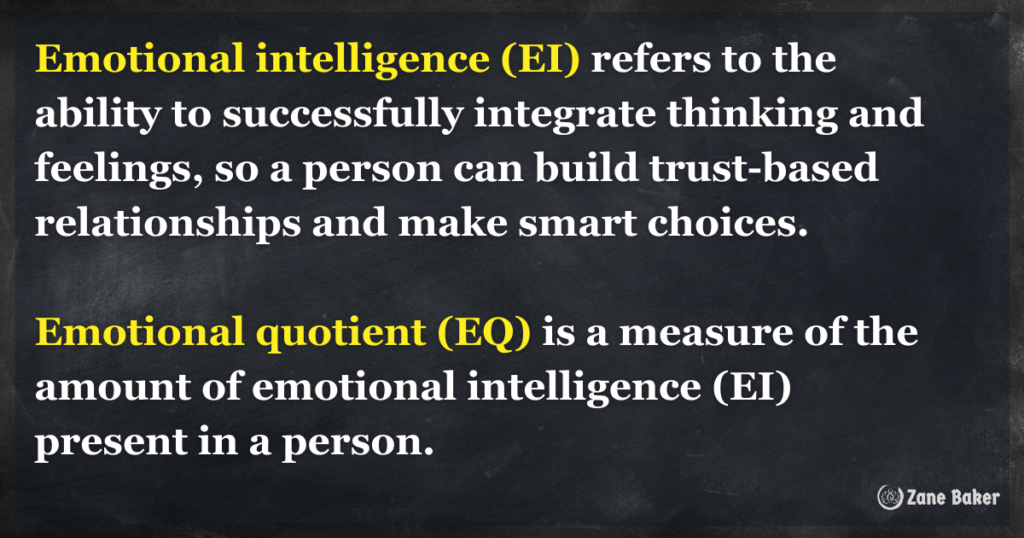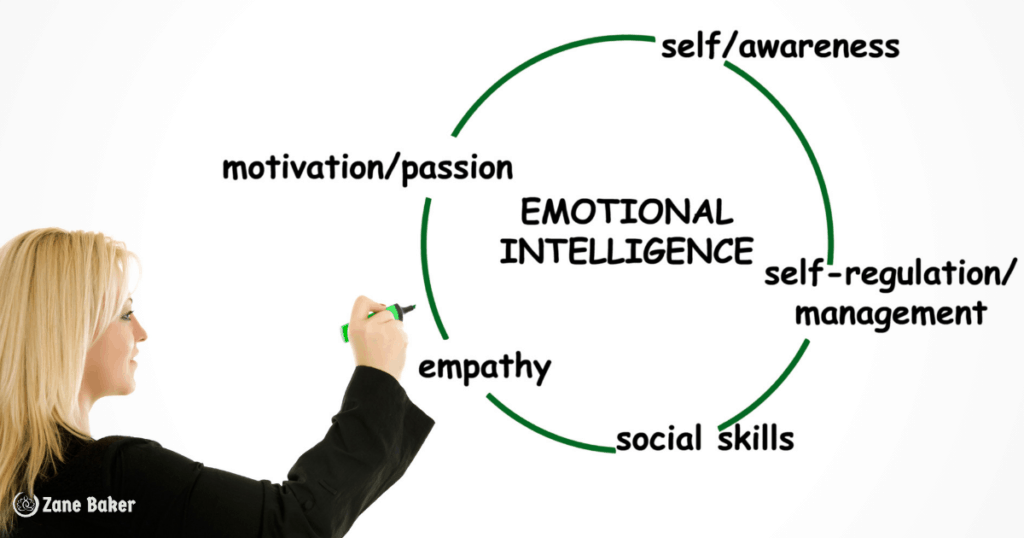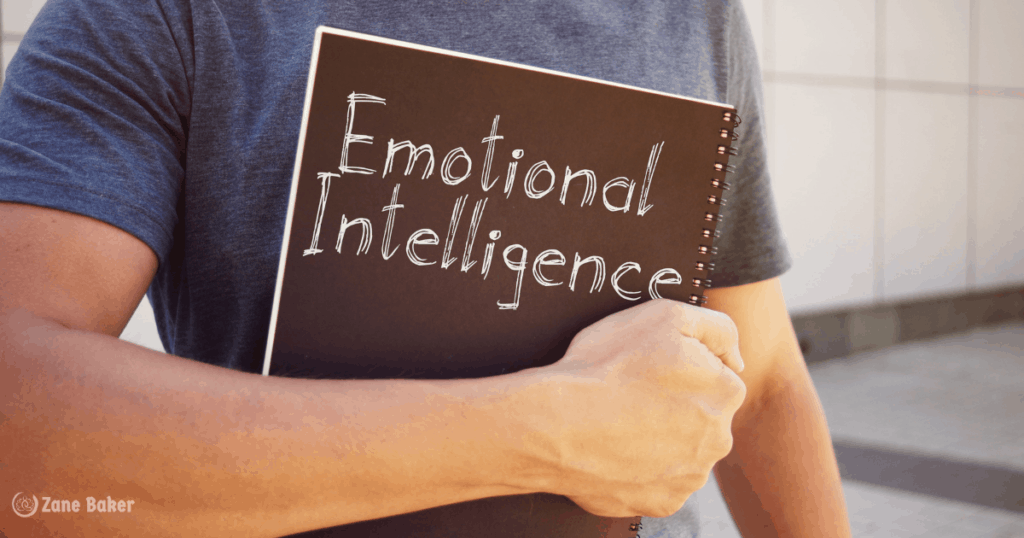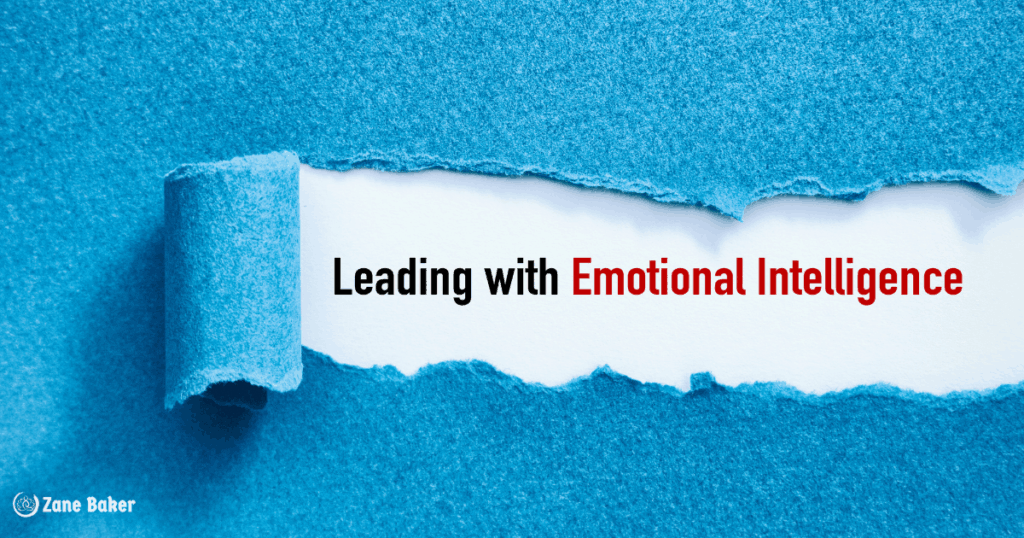When I first got introduced to the topic of emotional intelligence, I couldn’t help but ask, what emotional intelligence is, exactly?
What is emotional intelligence (EI)?
Emotional intelligence (EI), emotional intelligence EQ, also known as Emotional IQ is an individual’s ability to identify their own feelings and those of others, navigate emotional situations and respond to them appropriately.
In other words, being emotionally intelligent involves being able to discern your own emotions and others’, recognize various emotions, and respond to life and its challenges positively and professionally. To cultivate healthier mental health, it is crucial that we apply EI (emotional intelligence EQ) to guide our thinking and mental behavior.
What is emotional quotient (EQ)?
EQ Emotional Quotient represents the degree of emotional intelligence a human possess.
Usually, EQ is measured using score testing tools.
Scores are evaluated with evaluation tools such as the EI Test, which utilizes Goleman’s four-quadrant EI Competency Model.
To further your understanding of the EI Competency Model, read this book!
Emotional Intelligence: Why It Can Matter More Than IQ by Daniel Goleman.
Daniel Goleman is one of the leading researchers in brain and behavioral science, explaining why people with high IQs may still struggle while those with modest IQs can achieve success and high levels of performance. In his book, Goleman highlights that to be smart, there is more to it than having intellectual abilities. A combination of self-awareness, self-discipline, empathic measures and similar traits are important, too. Grab your copy of the book here.
Now, back to answering the what is (EQ) question.
Look at it this way, EI is having the ability to recognize and the ability to manage emotions in one’s self and others. On the other hand, EQ is the degree that a person can use that ability in emotional and social settings.
In essence, the “EQ” represents an assessment or measurement of a person’s innate emotional intelligence.
These two terms are often used interchangeably in discussion and writing about emotional intelligence. The lack of consistent standards can be confusing at times. Which leaves many people wondering, is there no difference between them?
What is the difference between emotional quotient and emotional intelligence?

All humans possess emotional intelligence (EI). To what extent a person is able to utilize their EI capabilities depends on their overall EQ.
During an individual’s formative years, their parents, teachers, and families are largely responsible for shaping their emotional abilities.
Developing emotional intelligence occurs during childhood and adolescence. Nonetheless, you can still improve your emotional intelligence skills through practice.
A child’s emotions, as well as social and interpersonal skills, can be developed or stunted based on their early life emotional experiences.
In my opinion, it is a parent’s number 1 priority to know that a child’s experiences play a significant role in the development of their personality and behavior. That’s why parents need to pay attention to their children’s ability to understand and manage emotions, feelings, and mental health.
Even though our childhood experiences may help shape our emotional intelligence, our EI and EQ continue to develop throughout adulthood.
Emotional intelligence is measured through EQ tests.
An EQ test measures a person’s overall emotional intelligence (EI).
To sum it up, EQ is meant to reflect a person’s ability to manage with self-awareness a wide variety of emotions so that they can think, talk, and act in a positive manner. This is what I call choosing to become more emotionally intelligent.
Building emotional intelligence, and society.
In today’s society, developing EQ is crucial to our well-being. The quality of our EQ influences our health, mental health, careers, and relationships.
On top of that, being emotionally intelligent plays a significant role in determining a person’s success or lack thereof.
Many experts agree that emotional intelligence is essential for leadership, job success, relationships, problem-solving, and overall success in both the personal and professional world.
Developing emotional intelligence
Being able to understand one’s own feelings and those of others is a sign of emotional awareness.
To be able to understand the emotions and respond to them with intelligence emotional response help you strengthen your emotional awareness.
Building a safe and positive world and releasing everyone’s full potential requires the development of emotionally intelligent individuals with high emotional intelligence and high social intelligence.
It is in developing emotionally intelligent individuals that we have our best chance for a brighter future.
To develop high emotional intelligence, a person must first understand what are the characteristics of being emotionally intelligent?
What are the 5 characteristics of emotional intelligence?

A neat detail to note is that “emotional intelligence” was first coined by Daniel Goleman in the 1990s.
According to Goleman, EI is composed of five characteristics or components. They are self-awareness, self-management (self-regulation), empathy (emotional sensitivity), motivation, and social skills. Let’s explore each component in detail!
Self-awareness
A key aspect of emotional self-awareness is the awareness that your emotional state can influence your thoughts, behavior, and how you interact with others.
Having a keen sense of emotional awareness is important during stressful situations.
Higher levels of awareness help you notice patterns, triggers, behavioral traits, and personality traits in yourself and others. You can use this ability when interfacing with people at work, at school, or in life.
How you manage your state of emotions and your overall feelings and behavior in any given moment is a characteristic of a high EQ and emotional awareness.
Self-management
Self-regulation is also known as emotional self-management means being able to control or change emotional responses by regulating thoughts and actions. It also means knowing when to take time to calm down before engaging in emotional or stressful situations.
To strengthen self-regulation abilities, it is essential to pay attention to your emotions when interacting with others.
An emotionally intelligent person is able with awareness to regulate their reaction and feelings, reduce tension and/or conflict, manage stress, and cope with life challenges.
Empathy (emotional sensitivity)
Empathy is the ability to understand and consider the feelings of others. It’s what I call being emotionally sensitive. In other words, empathizing is the process of being sensitive to another’s feelings and emotions.
Empathetic emotional intelligence entails understanding another person’s emotional state and responding to it appropriately. It also requires having emotional self-awareness and self-management skills.
Despite critics who deny that empathy has any influence on business, empathic leadership has become more prominent as businesses become more global.
People with empathetic EI skills are able to build stronger relationships and gain the trust of their family and friends, colleagues, clients, and fellow human beings. Empathy is crucial to learning about different cultures and business environments, as well as avoiding miscommunications and conflict.
Motivation
An emotion-savvy individual is motivated and can motivate others as well. Instead of seeking rewards such as fame or money, they seek fulfillment of a greater purpose.
Internally motivated people are constantly striving for improvement.
In the face of any obstacle, high EQ achievers strive to achieve success. They combine problem-solving abilities with leadership qualities, making them high performers.
Their leadership by example and sense of self-confidence make them role models in their communities.
Their motivation lies not in fame, fortune, status, or recognition but rather in the desire to grow as individuals and make a difference in the world.
These individuals are emotionally influential as they can actively and intentionally recognize which emotion and emotional reactions are appropriate in different situations.
Social skills
A person with high command of social skills and emotional maturity has the ability to manage emotions with ease. They are self-aware with strong emotional awareness of situations, and/or surroundings.
in short, having social skills is crucial for success in life.
I believe the ability to interact effectively with others in any setting, including home, school, work, and everywhere else, is more crucial than the other four aspects of EQ.
It is nearly impossible for anyone to accomplish important goals alone, no matter how charismatic, successful, or influential they are. The development of social intelligence is therefore an essential skill.
In conversations or conflict situations, High EQ people know how to respond to the needs of other people while keeping their needs in mind.
Among their most remarkable abilities is their ability to pick up on nonverbal cues, facial expressions, and body language of others.
These individuals are open-minded, attentive, and know-how to demonstrate leadership in any situation due to their friendly attitude, active listening, open body language, and outstanding rapport-building skills.
Now that you’re more knowledgeable about what emotional intelligence is and the 5 components of EQ based on Daniel’s Golman work, I want to share with you few tips to improve your emotional intelligence skills in life.
Can adults learn emotional intelligence?

In fact, emotional intelligence, just like academic intelligence, can be learned because it is made up of a wide range of social and emotional skills.
The emotional intelligence of a person can have a significant influence on how successful they are when dealing with other people in general.
Emotional intelligence has been found to play an important role in influencing a person’s ability to perform well at work, at home, and in school.
It cannot be denied that EQ has an essential role to play in human psychology, mental health, relationships, academic achievement, and overall, the general quality of life of humans.
Now let’s talk about how to practice being emotionally intelligent.
How do adults develop emotional intelligence?
Below, you’ll find 4 ways to help you cultivate a more emotionally intelligent personality. Let’s dig in!
1. Manage your relationship with stress
Stress seems to be everywhere in life.
Throughout our lives, stress influences our thoughts, feelings, emotions, and actions in a variety of ways.
In some cases, it feels nearly impossible to escape it because it is all around us – no matter how hard we try to avoid it, whether it be at work, school, or home.
To minimize the impact of stress on your life, you need to become aware of what emotion you are experiencing at any given moment.
Understanding how stressful situations affect your emotions will help you deal with the mental stress they cause.
Depending on how you react to an emotion, you can get a sense of how emotionally intelligent you are.
To be more emotionally intelligent when facing less than ideal situations, practice being mindful of your emotions but also take the time to assess what is happening.
The best way to release stress is to take a deep breath and relax. Exercising is another great way to relieve the stress from the body.
Your mental health will improve when you are more in tune with your own emotions and inner psychology.
Make meditating a regular part of your life to improve both your professional and personal performance. Meditation has helped me manage my mental health and PTSD flashbacks without any need for medical intervention. (Please consult with your medical team for any medical concerns – this is not advice). To learn more about how meditation helped me, please watch this video:
Meditation has well-documented benefits for good health, mental wellness, and positive psychology. Here’s what research has shown about the benefits of meditation.
I recommend starting with my FREE gratitude-based meditation if you are new to meditation.
Unruly emotions should not rule our lives.
2. Research your triggers
We are triggered by emotions, such as joy or anger, and we react as a result.
In the workplace or at home, a trigger can lead to severe emotional reactions, resulting in a negative state of mind.
You can remain emotionally healthy as long as you are able to manage your triggers.
In stressful situations, it is imperative to practice mindfulness.
With mindfulness practices, you can learn to better manage your emotional triggers.
In addition, you can use mindfulness to prevent triggers from affecting your mental state by allowing yourself to manage your emotions rather than be controlled by them.
The ability to influence one’s emotions is a fundamental aspect of emotional intelligence.
Understanding your triggers will help you address them before they escalate into something more serious. Society as a whole seems to have forgotten that self-mastery is a personal mission. If you have triggers, it’s your duty to find them and address them.
Your overall performance will improve as you continue to learn about your emotions and triggers.
A book that truly helped me understand triggers and emotions is “Feelings buried alive never die” by Karol Truman. Grab your copy to read that book here.

3. Improve your psychology
You can think of your psychological state as a reflection of your relationship with yourself.
Essentially, your emotions affect how you feel, thereby affecting your personality and emotional intelligence.
It is important to keep improving your emotional health to improve your mental health since EI has a significant impact on your emotional well-being.
Having better emotional intelligence will allow you to better handle your emotions and boost your psychological well-being.
Feelings are linked to emotional intelligence, according to research. Basically, emotional intelligence affects how you are emotionally and psychologically.
Individuals who are emotionally intelligent are better at managing their feelings/emotions than those who are not.
Additionally, EI can offer mental stability and personal growth. In my opinion, your job for being a human is to grow mentally, emotionally, physically, and psychologically.
You can improve your performance, relationships, and personality by improving your psychology.
Boost your EQ and Emotions With This Meditation MP3
4. Boost your relationships
As people improve their interpersonal skills, emotional and social skills, they improve emotionally. They become emotionally intelligent adults who understand themselves and can relate to others.
EQ skills can facilitate better relationships with friends, colleagues, spouses, or partners, or any form of relationship.
To put it simply, if you can identify your own emotions, you can also identify others’ emotions.
By being emotionally honest, you connect with the people around you rather than being emotionally distant, unavailable, or dishonest.
When using (EQ), we keep track of the constant changes we and others are going through.
An individual with a higher EQ is more sensitive to the needs of other people.
If you empathize and connect with the people in your relationships, you will be able to detect when things are changing and intervention is necessary.
In essence, when we understand others’ emotional experiences and sometimes traumas, we can discover the kind of love we all seek. I’m referring to unconditional love.
Once you understand how emotions work, you’ll be able to communicate better and understand others’ feelings. By doing this, you will strengthen your professional and personal relationships.
What are some examples associated with emotional intelligence?

Below you’ll find 5 examples associated with EQ and the best way you can use them in a job interview or during interactions with others.
#1: Reading emotions.
This skill is all about being able to read facial expressions, tones of voice, and body language. This will allow you to be emotionally sensitive to what’s going on around you and to adjust accordingly. For example, when a potential employer asks you a question, you can reply with self-confidence by reading their nonverbal cues and body language.
#2: Managing stress.
Managing stress effectively starts with having awareness of it and being able to manage it. People with high EQ use mindfulness and relaxation techniques to deal with personal or job-related challenges. For example, I use the 4-7-8 relaxation technique any time I feel anxious or stressed by life or work. An estimated 40% of workers report that their jobs are very stressful or extremely stressful, according to the National Institute for Occupational Safety and Health (NIOSH). So get a grip over whatever is stressing you.
#3: Handling emotions in others.
EQ helps you understand the emotional needs of people around you without having to ask them about it – this is what emotionally intelligent individuals do naturally. For example, if your partner/spouse is having a bad day you can discern with your EQ how they’re feeling and emotionally support them.
#4: Listening empathically.
Emotionally intelligent individuals can build really positive relationships with others by listening empathically. Being able to listen with intent is something that’s important in any profession, particularly in customer service, sales, and management. For example, an emotionally intelligent customer service staff uses empathic listening skills when talking to a stressed customer.
#5: Building good relationships with others.
This is all about being emotionally aware of other people’s needs and how to meet them in a light-hearted way. For example, being emotionally available to your spouse/partner’s needs.
Conclusions and Next Steps
Emotionally intelligent people are authentic, empathic, well-balanced, respectful of other people’s feelings, assertive but not aggressive, and supportive above all else.
It is not uncommon for recruiters to look for these EQ skills in candidates when filling positions. In certain scenarios, having EQ skills can mean the difference between landing a job or not.
In addition, showing up as your true self and being highly sensitive to others promote intimacy and strengthen ties in relationships, especially romantic ones.
It is important to remember that while some people come naturally with a strong EQ, others can acquire it.
A person can strengthen their EQ through practice. You’ll see marvelous results in a multitude of areas of your life if you put the time and effort into developing your EQ.
Here are a few things you can consider to improve your EQ:
1. Practicing mindfulness for 5-10 minutes every day will help you to be more emotionally sensitive. Start practicing mindfulness with this free guided meditation.
2. You might be able to get emotional intelligence training at your workplace. Many companies offer continuing education to their employees, especially to those in management and leadership positions.
3. EQ tests are useful for establishing a baseline. You can identify your strengths and weaknesses by taking a personality EQ test. This is the one I did (I am not affiliated with the company that offers the test, I am simply sharing what I used).
4. It is easy to find online EQ training programs. You can find many results by doing a quick google search. I personally get most of my online training from Udemy and Skillshare.
In the end, the better you understand your emotions, the less control they have over you.
It’s not a secret that learning these valuable EQ skills will improve your quality of life. So, what are you waiting for? Time for action!
Many thanks,
Zane











Facebook Comments